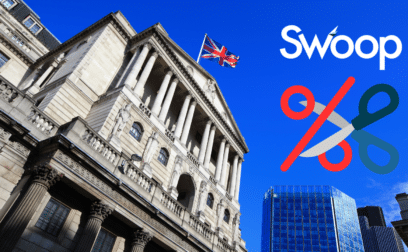TABLE OF CONTENTS
Page written by Rachel Wait. Last reviewed on October 1, 2024. Next review due April 6, 2025.

Owner-occupied commercial mortgages are designed for business owners looking to buy a commercial property for their trading premises.
Read on to find out how owner-occupied commercial mortgages work, the pros and cons of owner-occupied mortgages, and how to apply for one.
An owner-occupied commercial mortgage is a type of commercial mortgage that’s used to buy or refinance a property intended to be a business premises. This could be a shop, office or warehouse.
The property bought with this type of mortgage must be used by the applicant’s business.
An owner-occupied commercial mortgage can’t be used to buy a property that’s then rented out to others – in this situation, you would need a commercial investment mortgage.
If you apply for an owner-occupied commercial mortgage, you borrow the funds you require to buy the property from a lender, and then repay that sum in regular instalments over the term of the loan. Terms are typically five to 30 years and instalments are usually monthly, although in some situations, it may be possible to pay quarterly.
The mortgage is secured against the property or potentially more than one property.
Owner-occupied mortgages can be arranged on a capital repayment or interest-only basis.
You will need to be at least 18 years old to get an owner-occupied commercial mortgage. This type of mortgage is available to individuals, partnerships, limited companies and limited liability partnerships.
Each lender will have its own eligibility requirements, but you can expect the following factors to be taken into account:
You might need an owner-occupied commercial mortgage for any of the following reasons:
You can apply for an owner-occupied commercial mortgage with any of the following:
Be sure to compare interest rates, deposit requirements and eligibility criteria carefully. High street banks tend to have tighter eligibility criteria, and applications can take longer to process. But mortgage rates are often more competitive.
Challenger banks and online lenders, on the other hand, can be more lenient with their lending criteria and offer greater flexibility. This means they are more likely to lend to those with poor credit. Specialist lenders are also more likely to lend to newly-established companies. But the downside is that interest rates tend to be higher.
To help you find the right owner-occupied commercial mortgage, it can be wise to approach a commercial mortgage broker. Mortgage brokers can look closely at your financial situation and match you with those lenders more likely to accept your application. A good broker will also help you complete your mortgage application, as well as spot any issues before they become problematic.
Swoop’s team of specialists are professionals in their fields. We work with borrowers, using our knowledge, experience and skills to present deals to lenders in the best shape possible. We can help you find the best mortgage rates and do the hard work for you, using our experience and knowledge of lenders’ appetite and criteria. This means we can get your application in front of the right lenders and underwriters as quickly as possible, saving you time and effort.
Register with Swoop to get started.
As a first step, you’ll need to consider what you plan to use the property for and whether you need to change the current use of the property. This can affect the amount you need to borrow.
It’s also sensible to check your company finances to work out how much you can afford to spend before you start to compare mortgages.
When you’ve worked this out, speak to a mortgage broker who can advise you on the most suitable lenders and mortgages. Once you’ve found the right mortgage, complete your application. Your broker should be able to help you with this.
When applying, you will usually need to supply:
Lenders will also want to know more about the property you wish to buy. Details they could ask for include the agreed purchase price, the condition of the property, and what you plan to use it for.
If the lender approves your application, the mortgage can be completed. You’ll then need to sign the relevant legal documents and start making your mortgage repayments.
This will depend on the situation, but generally, you can expect your application to be completed within six to 12 weeks. Completing your application carefully and having all the necessary documents to hand can help speed up the process.
As well as the interest you’ll be charged on your owner-occupied commercial mortgage, you can expect to pay a range of fees. These might include:
You could pay a margin of between 2% and 6% per year, but this will depend on a range of factors. These include:
You can generally choose from fixed-rate and variable-rate owner-occupied commercial mortgages.
With a fixed-rate mortgage, the rate of interest and therefore your repayments stay the same for the length of the mortgage term. With a variable-rate mortgage, on the other hand, the rate of interest can go up or down depending on market conditions, meaning your repayments could also fluctuate.
Most commercial mortgage lenders have no maximum loan size, while the minimum loan size is typically around £50,000. It is worth considering that the costs accrued arranging this facility (valuation, arrangement fees, solicitors fees) often outweigh the benefits when borrowing a lower amount.
The amount you can borrow will depend on the same factors we mentioned above. If you have a good credit history, you have experience in the commercial lending sector, and your business is in good financial health, you’re likely to be able to borrow a larger sum.
You’ll typically need to put down at least a 25% deposit. However, you may need to put down a larger deposit if you’re viewed as a higher risk, perhaps due to poor credit.
In other situations, you might be able to put down a smaller deposit or even no deposit at all. This is the case for certain sectors, for instance, if you’re running a medical practice, such as a doctor’s or dental surgery. These practices are viewed as lower risk so lenders will be more prepared to accept lower deposits. The downside is you’re likely to have fewer lenders to choose from.
Yes, you can use commercial property as collateral for a mortgage. You might want to do this if you’d prefer not to raise a deposit from savings, but remember that if you can’t keep up with your mortgage repayments, the property is at risk.
You can do this in the following ways:
Before deciding whether an owner-occupied commercial mortgage is right for you, you should weigh up the pros and cons.

Pros

Cons
An investment property is rented out to other individuals or businesses as an investment. With an owner-occupied property, on the other hand, you will occupy the property yourself. If it’s a commercial owner-occupied property, you’ll need to use it for business premises. If it’s residential, you’ll live in it.
Our team at Swoop would be happy to discuss your requirements with you to help you find the right owner-occupied commercial mortgage. Begin with the best deal to give your project the best start possible. Register with Swoop today to get started.
Rachel has been writing about finance and consumer affairs for over a decade, helping people to get to grips with their finances and cut through the jargon. She's written for a range of websites and national newspapers including MoneySuperMarket, Money to the Masses, Forbes UK, and Mail on Sunday. Rachel has covered almost every financial topic, from car insurance and credit cards, to business bank accounts and mortgages.
Swoop promise
At Swoop we want to make it easy for SMEs to understand the sometimes overwhelming world of business finance and insurance. Our goal is simple – to distill complex topics, unravel jargon, offer transparent and impartial information, and empower businesses to make smart financial decisions with confidence.
Find out more about Swoop’s editorial principles by reading our editorial policy.
Related pages
Ready to grow your business?
Get your free Owner-occupied commercial mortgages quote today
Join the 70,000+ businesses just like yours getting the Swoop newsletter.
Free. No spam. Opt out whenever you like.



























We work with world class partners to help us support businesses with finance
Suite 42, 4th Floor, Oriel Chambers, 14 Water Street, Liverpool, L2 8TD
View in Google MapsKingfisher Way, Silverlink Business Park, Newcastle upon Tyne, NE28 9NX, UK
View in Google MapsSuite 105A, Airivo, 18 Bennetts Hill, Birmingham, B2 5QJ
View in Google MapsAberystwyth Innovation and Enterprise Campus
Gogerddan Campus
Aberystwyth University
Ceredigion
SY23 3EE
Dogpatch Labs, The CHQ Building, Custom House Quay, Dublin, Ireland
View in Google MapsSuite 801, Level 8, 84 Pitt Street, Sydney, NSW 2000, Australia
View in Google Maps43 W 23rd St, New York, NY 10010, United States
View in Google Maps21 Dreyer Street, Cape Town, South Africa, 7708
View in Google MapsThanks for requesting a call back
a member of the team will be in touch.




